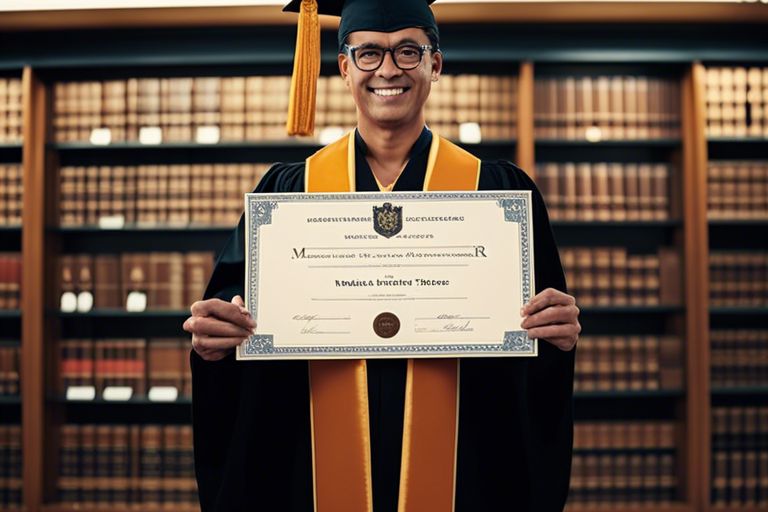It’s no secret that the field of archiving is a crucial component of preserving our collective history and memory. The Master of Archive Studies (MAS) program offers a deep look into the principles and practices of organizing, managing, and preserving records and documents of cultural, historical, and institutional significance. In this blog post, we will explore the importance of pursuing a MAS degree, the core courses typically included in the curriculum, and the career opportunities available to graduates in this vital field.

Key Takeaways:
- Specialized Program: The Master of Archive Studies (MAS) is a specialized program specifically designed for individuals interested in pursuing a career in archives and records management.
- Career Opportunities: Graduates of MAS programs have a wide range of career opportunities in archives, libraries, museums, government agencies, and other information management settings.
- Hands-on Experience: MAS programs often include practical training components such as internships and fieldwork, providing students with valuable hands-on experience in the field of archives.
Program Overview
Definition and Purpose
While many may be unfamiliar with the field of Archive Studies, it plays a crucial role in preserving our history, culture, and heritage. The Master of Archive Studies (MAS) program equips students with the skills and knowledge needed to manage, organize, and protect valuable archival materials for future generations.
Duration and Structure
To understand the Master of Archive Studies program, it is important to grasp its duration and structure. Typically, MAS programs last one to two years and are designed to provide students with a comprehensive understanding of archival principles, practices, and technologies. Students can expect to explore into courses covering topics such as collection development, digital preservation, and archival management.
Understanding the duration and structure of the MAS program allows prospective students to plan their academic journey effectively. The curriculum usually includes a combination of theoretical coursework, practical training, and hands-on experience in archival settings. This well-rounded approach ensures that graduates are well-prepared to excel in the field of archives and records management.

Curriculum
Core Courses
Any Master of Archive Studies (MAS) program will have a set of core courses that provide students with a strong foundation in archival theory and practice. These courses typically cover topics such as archival appraisal, arrangement and description, preservation and access, and records management. Students will learn about the ethical and legal issues that surround archives, as well as the importance of providing access to information while protecting individuals’ privacy.
Electives and Specializations
The Master of Archive Studies (MAS) program also offers a range of electives and specializations that allow students to tailor their learning experience to their interests and career goals. Students may choose to focus on digital archives, community archives, archival education, or another specialized area within the field. The flexibility of electives and specializations ensures that students graduate with the skills and knowledge needed to excel in their chosen area of archival practice.
The electives and specializations in the MAS program provide students with the opportunity to explore deeper into specific topics within the field of archive studies, allowing them to develop expertise in areas that align with their professional interests.
Research and Thesis Components
To culminate their Master of Archive Studies (MAS) program, students typically complete a research project or thesis that demonstrates their ability to apply archival theory and practice to real-world scenarios. This component of the program allows students to showcase their critical thinking, research, and writing skills, as well as their understanding of ethical considerations in the field of archives.
An integral part of the MAS program, the research and thesis components provide students with the opportunity to contribute original research to the field of archive studies, furthering the knowledge and understanding of archival best practices.
It is through the comprehensive curriculum of the MAS program that students gain the necessary skills and knowledge to become effective archivists and information professionals, equipped to preserve and provide access to valuable records and information for future generations.
Career Opportunities
Archival Management
One of the paths you can take with a Master of Archive Studies (MAS) degree is in archival management. This role involves overseeing the organization, preservation, and access to historical documents and records. Archival managers work in various settings such as museums, historical societies, government agencies, and corporate archives.
Records Management
Career opportunities in records management are also available for MAS graduates. Records managers are responsible for the efficient and systematic control of an organization’s records throughout their lifecycle. This role is crucial for ensuring compliance with regulations, risk management, and decision-making based on accurate and reliable information.
Career opportunities in records management are diverse, with roles in both the public and private sectors. Records managers may work in industries such as healthcare, finance, government, and more, helping organizations effectively manage their information assets.
Digital Preservation
With the increasing shift towards digital records and archives, there is a growing need for professionals in the field of digital preservation. MAS graduates can pursue careers in preserving digital materials, ensuring their long-term viability and accessibility. Digital preservationists work on strategies to prevent data loss, format obsolescence, and technological challenges in maintaining digital information.
Information Governance
Management of information governance is another area where MAS graduates can have a successful career. Information governance involves developing and applying policies, procedures, and controls to manage information assets effectively. Professionals in this field ensure compliance with legal and regulatory requirements, as well as alignment with an organization’s objectives and values.
The field of information governance is rapidly evolving, with the increasing focus on data privacy, security, and compliance. Records and information managers play a vital role in helping organizations navigate these complexities and achieve their information management goals.
Admission Requirements
Academic Background
Keep in mind that the Master of Archive Studies (MAS) program requires applicants to have a bachelor’s degree from a recognized institution. Any academic background is eligible for consideration, but a degree in a related field such as history, information science, or library studies may be advantageous.
Prerequisite Courses
On top of a bachelor’s degree, applicants may need to have completed certain prerequisite courses to be eligible for the MAS program. These courses typically cover topics such as archival principles, information management, or research methods.
The completion of prerequisite courses ensures that students have a solid foundation in archive studies before venturing into the advanced coursework of the MAS program. Students who do not meet these requirements may be required to take additional courses before starting the program.
Language Proficiency
The MAS program may also have language proficiency requirements for non-native speakers. The ability to effectively communicate and comprehend academic material in the language of instruction is crucial for success in the program. This requirement may be assessed through standardized language proficiency tests.
For Language Proficiency
For applicants whose first language is not the language of instruction, demonstrating proficiency through tests such as the TOEFL or IELTS is often necessary. These tests help ensure that students can fully engage with the curriculum and participate in discussions with faculty and peers.
Plus, meeting language proficiency requirements can also enhance students’ overall experience in the MAS program by enabling clear communication and comprehension of complex archival concepts.
Skills and Competencies
Once again, the Master of Archive Studies (MAS) program equips students with a range of skills and competencies that are vital for success in the field of archives. These skills are highly sought after by employers in the information management sector and are crucial for professional development in archival practice.
Information Literacy
For those pursuing a career in archives, information literacy is a fundamental skill. MAS students learn how to effectively locate, evaluate, and ethically use information from a variety of sources. This skill is invaluable when conducting research, curating collections, or providing information services to users.
Digital Literacy
An vital skill in today’s digital age is digital literacy. MAS students are trained to navigate digital environments, including databases, digital archives, and other electronic resources commonly found in archival institutions. Understanding digital tools and technologies is key to preserving and providing access to digital records.
Information professionals must adapt to the rapid pace of technological advancements and the increasing digitization of information. Digital literacy is crucial for managing digital collections, implementing digital preservation strategies, and ensuring the long-term accessibility of digital materials.
Communication and Collaboration
An important aspect of archival work is the ability to communicate effectively and collaborate with colleagues, stakeholders, and researchers. MAS students develop strong written and verbal communication skills, allowing them to convey complex information clearly and concisely. Collaboration skills are vital for working in interdisciplinary teams, engaging with diverse communities, and fostering partnerships with external organizations.
Collaboration in the field of archives often involves working on projects that require input from multiple stakeholders, such as digitization initiatives, exhibitions, or archival outreach programs. Effective communication and collaboration are key to ensuring the success of these projects and promoting the value of archives within the broader community.
Critical Thinking and Analysis
An vital skill for archival professionals is critical thinking and analysis. MAS students are trained to evaluate information critically, assess the authenticity and reliability of records, and interpret complex archival materials. Critical thinking skills enable archivists to make informed decisions when appraising, arranging, and describing collections, as well as when providing reference services to users.
Analysis plays a key role in archival practice, especially when conducting research, developing finding aids, or conducting preservation assessments. Archivists must be able to analyze information effectively to extract meaningful insights, identify patterns, and make connections between different records and collections.
Professional Development
Networking Opportunities
The Master of Archive Studies (MAS) program offers students various networking opportunities to connect with professionals in the field. Through conferences, workshops, and guest speaker events, students can interact with archivists and experts, building valuable relationships that can help advance their careers.
Internships and Practicum
To enhance practical skills and gain real-world experience, MAS students have the opportunity to participate in internships and practicum placements at various archival institutions. These hands-on experiences allow students to apply their knowledge in a professional setting, preparing them for future roles in the field.
For instance, students may work on digitization projects, archival processing, reference services, or outreach initiatives during their internships, gaining a comprehensive understanding of archival practices.
Continuing Education and Certification
Professional development is necessary in the field of archives, and the MAS program supports students in pursuing continuing education and certifications. By staying updated on the latest trends, technologies, and best practices, graduates can enhance their skills and stay competitive in the job market.
Education in areas such as digital preservation, records management, and archival ethics can further expand students’ knowledge and expertise, making them valuable assets to archival institutions.
Summing up
Master of Archive Studies (MAS) is a crucial program for individuals looking to become experts in managing and preserving information. Through this program, students gain valuable skills in archival theory, digital preservation, and records management. The knowledge and expertise acquired through MAS can lead to exciting career opportunities in various industries like government agencies, museums, and corporations.
Overall, the MAS program equips students with the necessary tools to navigate the complex world of archives and information management. It is a rewarding field that requires attention to detail, critical thinking, and a deep appreciation for preserving our historical records. Graduates of MAS will play a vital role in safeguarding our collective memory for future generations to come.
FAQ
Q: What is Master of Archive Studies (MAS)?
A: Master of Archive Studies (MAS) is a specialized graduate program that focuses on the theory and practice of archival science. It equips students with the knowledge and skills necessary to work in archives, libraries, museums, and other information management settings.
Q: What does the curriculum of MAS typically include?
A: The curriculum of MAS programs usually covers a wide range of topics such as archival theory, records management, preservation techniques, digital archives, information governance, research methods, and practical hands-on experience through internships or projects.
Q: What career opportunities are available to MAS graduates?
A: MAS graduates can pursue diverse career paths in the field of archives and information management. They can work as archivists, records managers, digital preservation specialists, librarians, curators, information officers, and researchers in various institutions such as government agencies, universities, corporations, museums, historical societies, and non-profit organizations.

